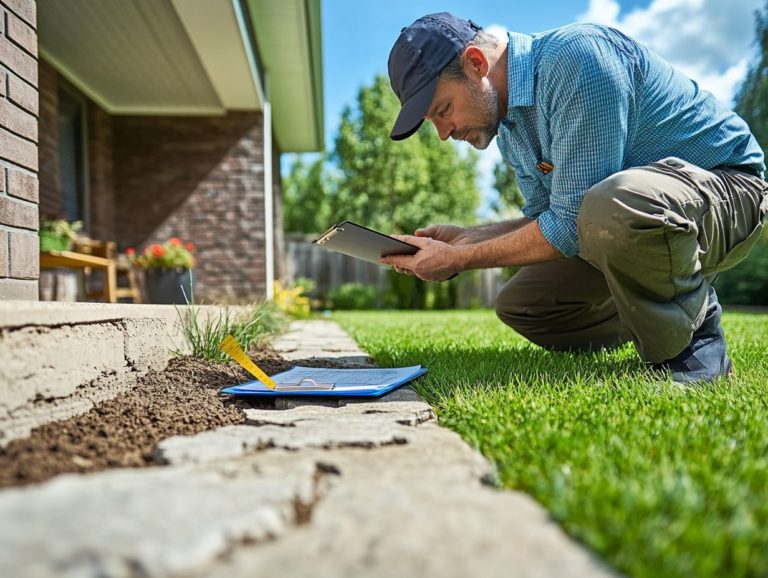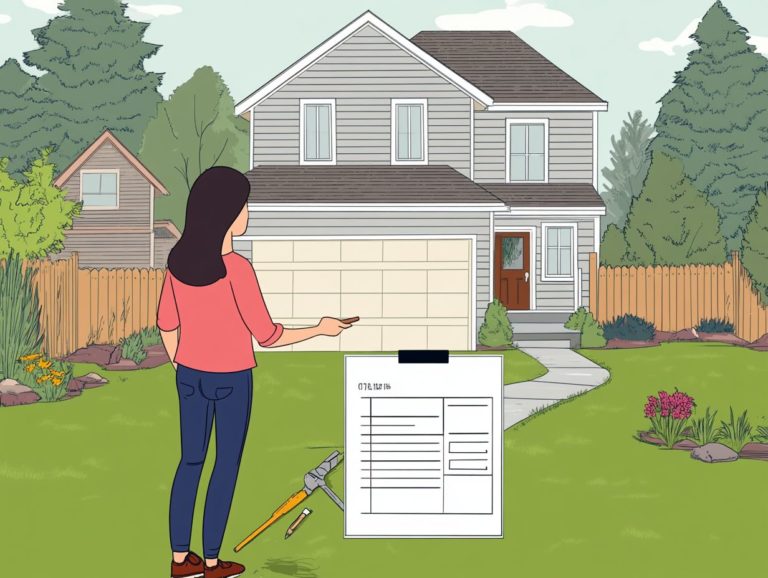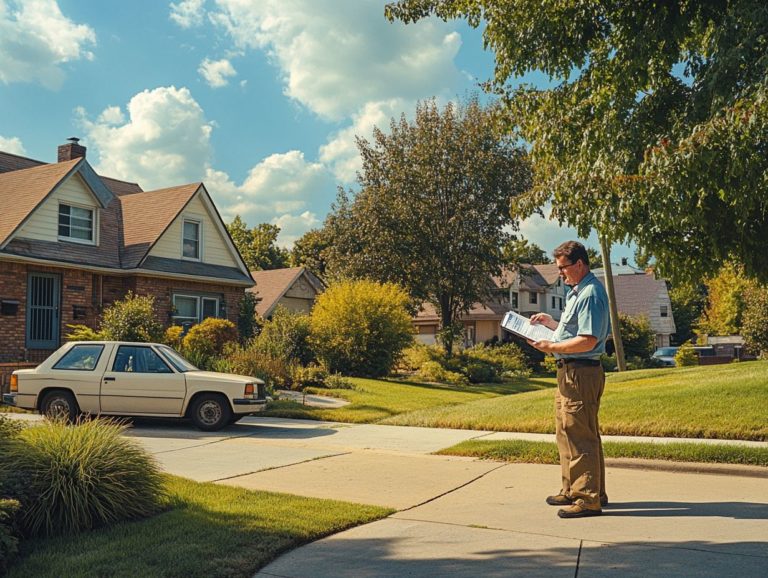The Importance of Home Inspections in Property Sales
When you re buying or selling a home, grasping the nuances of home inspections can truly set you apart. A careful check allows buyers to uncover potential issues while providing sellers the opportunity to rectify concerns before hitting the market.
This article delves into the essentials of home inspections, showcasing the advantages for both parties, detailing the inspection process, and offering guidance on selecting the ideal inspector. Arm yourself with the insights needed to navigate this vital phase of your real estate journey with confidence!
Contents
- Key Takeaways:
- Understanding Home Inspections
- Key Benefits for Buyers
- Benefits of Home Inspections for Sellers
- The Home Inspection Process
- Choosing a Home Inspector
- Follow-Up Inspections
- Frequently Asked Questions
- What is a home inspection and why is it important in property sales?
- Who is responsible for the cost of a home inspection?
- Can a home inspection affect the sale of a property?
- What are some common issues that may be uncovered during a home inspection?
- Can a home inspection be waived in a property sale?
- What should I do if a home inspection reveals problems in a property I am interested in purchasing?
Key Takeaways:

- Home inspections provide crucial information for both buyers and sellers in property sales.
- They help identify potential issues and build trust.
- For buyers, home inspections offer negotiating power and informed decision-making.
- Sellers can address issues before listing and avoid surprises.
- Choosing a qualified home inspector is essential for a smooth transaction.
Understanding Home Inspections
Understanding home inspections is crucial for your success! This process entails a careful check of a property’s condition, carried out by a qualified home inspector. Various systems within the home such as heating, ventilation, air conditioning (HVAC), plumbing, electrical, and the foundation are thoroughly assessed to uncover any significant issues that may impact the property s value.
A detailed inspection report not only brings existing problems to light but also gives you the power to make informed decisions, ensuring that your investment aligns with your needs and expectations for your ideal home.
Key Benefits for Buyers
Home inspections offer significant benefits, serving as a vital asset in the home-buying journey. By pinpointing major issues like electrical problems, plumbing concerns, and potential safety hazards, you gain the insight needed to make informed decisions about your future home.
The inspection report reveals critical details about the property’s condition, giving you the power to negotiate effectively with the seller for necessary repairs or adjustments in the purchase agreement. Understanding the importance of pre-purchase home inspections safeguards your investment and keeps your ideal home safe.
Identifying Potential Issues
Identifying potential issues is one of the primary benefits of conducting a home inspection, offering you invaluable peace of mind as a home buyer. A professional home inspector carefully evaluates the property, searching for major concerns that could jeopardize safety or the structure’s integrity think mold problems, pest infestations, and HVAC system failures.
The insights gained from such inspections inform you about the property’s current condition and help anticipate future maintenance needs, enabling you to plan and budget more effectively. Home inspectors typically assess the state of the roofing, plumbing, and electrical systems.
For instance, hidden leaks can cause serious water damage if left unattended, while outdated wiring may pose significant fire hazards. Structural issues, like cracks in the foundation or uneven flooring, deserve immediate attention and can dramatically impact the property’s value.
By pinpointing these potential problems early, you empower yourself to make informed decisions whether negotiating repairs or adjusting your purchase offer ultimately securing a more solid investment.
Ready to take the next step? Consider scheduling a home inspection today to ensure your peace of mind!
Negotiating Power
The inspection report details the property’s condition. You can pinpoint necessary repairs and use this to negotiate changes to the purchase agreement.
This situation may influence the closing date, as it might take time for the seller to address reported issues or for you to reassess your options based on what the inspection reveals.
Armed with tangible evidence of the property’s strengths and weaknesses, you often find yourself more confident in presenting your case to the seller.
An inspection report not only highlights immediate concerns, like plumbing or electrical issues, but also uncovers potential future problems. This comprehensive view gives you the power to negotiate for price reductions or to request that the seller carry out specific repairs before the final sale.
Ultimately, grasping the findings of a home inspection can be a game-changer, setting the tone for negotiations and influencing the final terms of the sale, as highlighted in the key role of home inspections in real estate.
Benefits of Home Inspections for Sellers
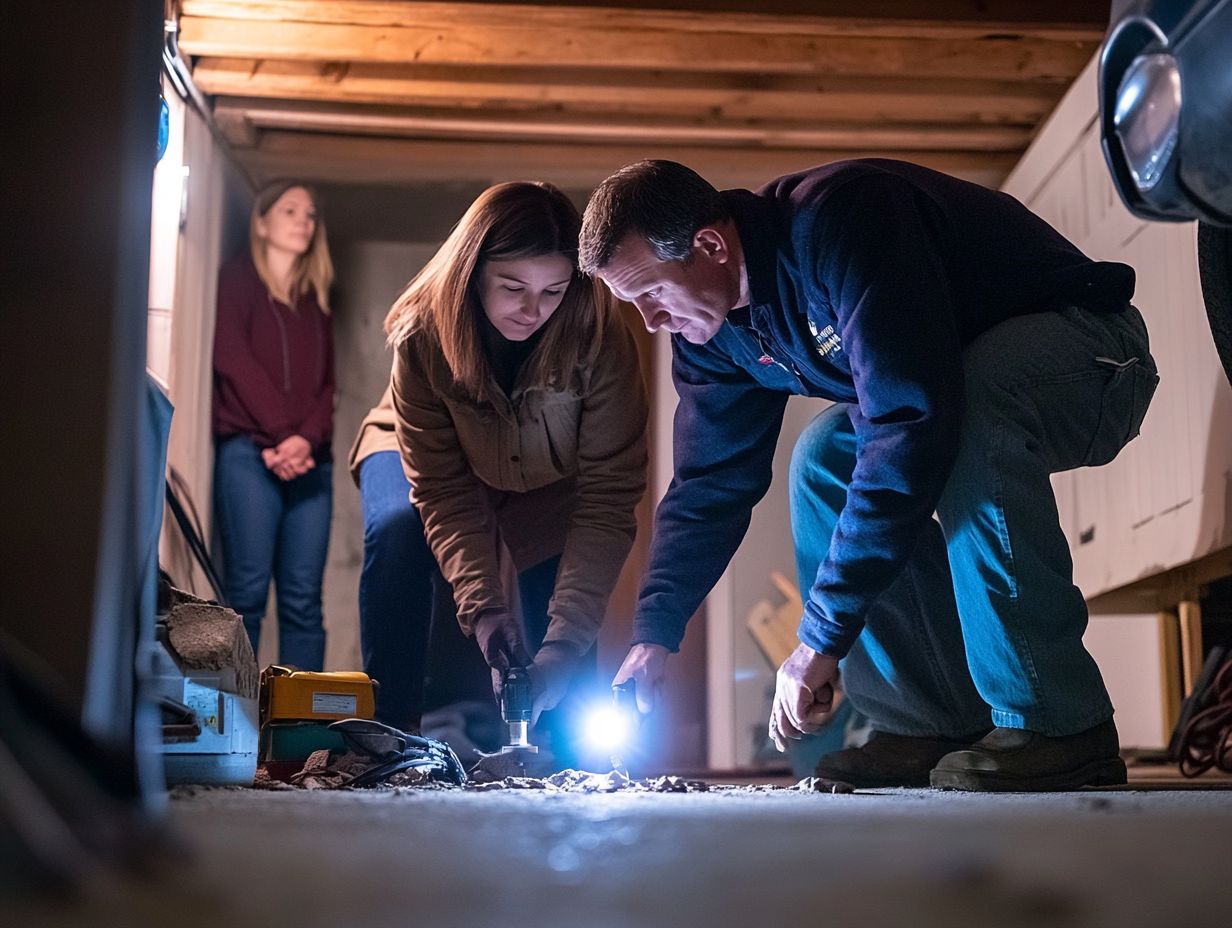
Home inspections provide a wealth of advantages for you as a seller in today’s competitive housing market. Understanding the role of home inspections in real estate transactions significantly enhances your ability to attract buyers and secure favorable purchase agreements.
By taking the initiative to address any issues before listing your property, you can sidestep potential closing delays and elevate your home s appeal. This ultimately increases its value.
With the expertise of a real estate agent by your side, you can adeptly navigate the inspection process. This ensures that any potential red flags are effectively managed. This proactive approach can lead to a smoother transaction, allowing you to accept offers with complete confidence.
Addressing Issues Before Listing
Addressing issues before listing your home is a crucial strategy for ensuring a successful sale. By conducting a thorough property inspection, you can identify foundation problems, safety hazards, and other concerns that might deter potential buyers.
Tackling these issues head-on facilitates a smoother transaction and reduces the likelihood of buyers backing out due to unexpected findings during their own inspections.
Common issues like outdated wiring, leaky roofs, or plumbing problems can significantly impact your home s marketability. Buyers are often wary of homes showing signs of mold or pest infestations, viewing them as potential hidden headaches.
By addressing these problems before you list, you enhance your property s appeal. This can potentially attract increased offers from buyers who appreciate that they won t have to navigate costly repairs after the purchase. Proactively managing these aspects boosts your confidence and creates a welcoming atmosphere.
Encouraging prospective owners to imagine themselves in the space without the cloud of immediate repairs looming overhead is essential.
Building Trust with Buyers
Building trust with buyers is essential for you as a seller, and a home inspection is crucial for establishing transparency throughout the real estate transaction.
Sharing the inspection report honestly makes buyers feel secure. This transparency can speed up the closing process and help you close the deal faster.
Effective communication during the inspection process can ease potential concerns often tied to home buying. Consider inviting buyers to attend the inspection or offering a pre-inspection for yourself before listing.
This proactive approach builds rapport and encourages dialogue about the property’s condition, allowing for questions and clarifications that can further solidify trust.
When you engage in an open conversation about the property’s nuances, it humanizes the transaction. This transforms a potentially stressful experience into a partnership, fostering a more positive relationship within the real estate market.
The Home Inspection Process
The home inspection process stands as a crucial milestone in your home buying journey, highlighting the importance of home inspections in real estate transactions and guiding you through the intricate assessment of a property’s condition.
It all starts with hiring a qualified home inspector, who will perform a thorough examination of various systems within the home, including heating, ventilation, and air conditioning (HVAC), plumbing, electrical systems, and the foundation.
Once the inspection is complete, you’ll receive a detailed report highlighting any identified issues. This may prompt follow-up inspections to ensure that necessary repairs are addressed, ultimately safeguarding your investment and providing you with peace of mind.
What to Expect During an Inspection
During a home inspection, you can expect a careful check by a qualified home inspector, who will assess the property for various safety concerns and its overall condition.
This includes a thorough evaluation of critical systems such as HVAC, plumbing, electrical systems, and the foundation. The inspector will deliver detailed findings, serving as an essential reference for understanding the property’s current state and any potential future repairs you may need to consider.
They will identify potential hazards, like mold or inefficient insulation, which could impact the safety and energy efficiency of your home.
This comprehensive evaluation gives you the power to make informed decisions, enabling you to negotiate repairs or adjust the price based on the inspector’s findings.
For sellers, an inspection can uncover necessary improvements that enhance marketability and bolster investor confidence. Understanding the importance of home inspections in property transactions ensures that both parties have a clear understanding of the property’s condition, ultimately fostering transparency and trust in the real estate transaction.
Choosing a Home Inspector

Choosing the right home inspector is crucial! As a buyer, you should prioritize inspectors certified by esteemed organizations like the American Society of Home Inspectors or the International Association of Certified Home Inspectors.
Check the Better Business Bureau ratings for valuable insights into an inspector’s reputation and reliability. This diligence ensures that you engage an inspector capable of conducting a meticulous evaluation of the property, ultimately safeguarding your investment.
Qualities to Look for in a Home Inspector
When you’re in the market for a home inspector, certain qualities are essential for ensuring a successful and comprehensive inspection. You want an inspector who possesses strong communication skills, someone who can convey their findings clearly and effectively.
Attention to detail is paramount; it allows the inspector to identify even the most subtle issues within the property, ensuring a thorough review of all home systems.
An effective home inspector also exhibits a high level of professionalism and a commitment to ethics, which helps build trust between them and you. Their experience in various types of inspections ranging from structural assessments, which check for the strength and safety of the building structure, to safety checks is crucial.
You ll benefit from timely reports that are not only insightful but also easy to understand, greatly enhancing your decision-making process.
A good inspector stays updated on industry standards and local regulations, ensuring their evaluations are both current and comprehensive. This makes them an invaluable resource throughout your home-buying journey!
Ensuring a Smooth and Informed Transaction
A smooth and informed transaction depends on your collaboration with your real estate agent and the home inspector. By working closely with your agent, you can gain valuable insights into the home inspection process and learn how to interpret the findings effectively.
This teamwork gives you the power to make educated decisions about your home purchase, resulting in a more straightforward and confident transaction.
Clear communication is essential in this synergy. Your real estate agent can help interpret inspection reports, highlight potential red flags, and negotiate repair requests on your behalf.
Understanding the nuances of the inspection findings is crucial; home inspectors provide an unbiased assessment of the property’s condition, highlighting the importance of a home inspection for buyers and enabling you to make informed choices.
In this dynamic triangle, each party plays a vital role in ensuring that all concerns are addressed, allowing you to feel secure in your investment.
Ultimately, this collaborative approach not only enhances trust but also streamlines the entire home-buying experience for you.
Start your home inspection journey today for a safer tomorrow!
Follow-Up Inspections
Follow-up inspections are crucial in the home buying process, especially when initial inspections uncover significant issues that need attention.
As a home buyer, you can use these follow-up inspections to confirm that the seller has completed the agreed-upon repairs to your satisfaction. This ensures the property aligns with your expectations.
Follow-up inspections help you negotiate repairs and understand the real costs involved. Ultimately, this step safeguards your investment and boosts your confidence in your home purchase.
Watch this video to understand the importance of follow-up inspections!
Frequently Asked Questions
Got questions about home inspections? Here are some common inquiries to help you navigate the process!
What is a home inspection and why is it important in property sales?
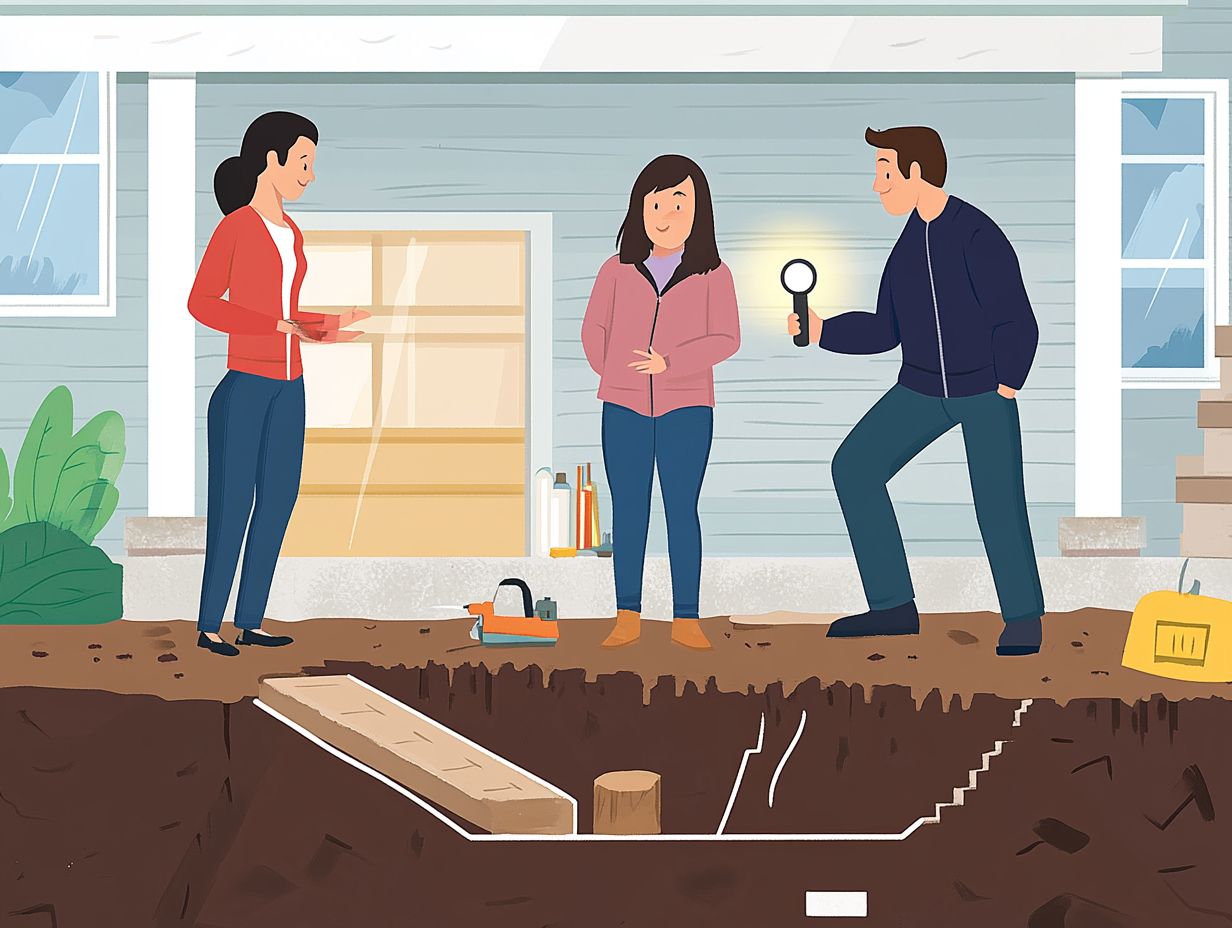
A home inspection is a thorough examination of a property’s condition, typically conducted by a licensed professional. This process provides valuable information about the property’s current state, potential issues, and overall value.
Who is responsible for the cost of a home inspection?
Typically, the buyer is responsible for the cost of a home inspection. However, some sellers may choose to cover this cost to attract potential buyers and demonstrate their commitment to transparency.
Can a home inspection affect the sale of a property?
Yes, a home inspection can significantly impact a property sale. Understanding the role of home inspections in home sales is crucial, as uncovering major issues or safety hazards may lead a buyer to back out of the sale or renegotiate the contract terms.
What are some common issues that may be uncovered during a home inspection?
Common issues during a home inspection may include structural damage, plumbing or electrical problems, roof damage, mold or pest infestations, and code violations.
Can a home inspection be waived in a property sale?
Technically, a buyer can waive a home inspection. However, this is not recommended as it risks purchasing a property with undisclosed costly issues.
What should I do if a home inspection reveals problems in a property I am interested in purchasing?
If a home inspection reveals problems in a property you are interested in purchasing, you have a few options. You can negotiate with the seller to address the issues or lower the sale price. If the problems are too significant, you may choose to back out of the sale.

